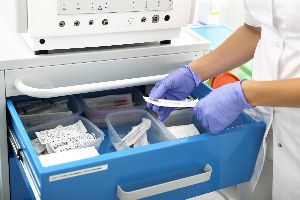What's the Difference Between USP 797 & USP 800?

Pharmacies do more than manage medications and fill prescriptions. They also keep both patients and health care providers safe. This includes following specific protocols to preserve the quality and sterility of pharmaceutical products and protecting providers from the effects of hazardous drugs. Pharmacies use the United States Pharmacopeia (USP), an annually updated set of standards for food, medicine, and supplement safety, to guide their efforts. Two of the guidelines, USP 797 and USP 800, relate to compounding pharmacies where medications are prepared and mixed according to individual patient needs; review this guide to learn more about them.
USP 797
USP 797 applies to all facilities that produce compounding medications, including hospital pharmacies, operating rooms, chemotherapy units, and radiopharmacies. The ultimate goal of these standards is to ensure that patients don't receive contaminated drugs and that all medications are administered at the correct dosages.
The standards prevent drugs from being contaminated by chemicals, microbes, and endotoxins and ensure that they're mixed at the proper strength. USP 797 covers everything from the correct humidity, temperature, and pressure standards for storing medications to rules for HVAC systems, personal protective equipment for pharmacists, and training requirements. It also outlines the proper procedures for testing medications and any additional equipment required for compounding.
USP 800

While USP 797 focuses on patient safety, USP 800 is designed to protect health care providers from exposure to potentially harmful medications. More than 260 drugs — and chemotherapy treatments in particular — have potential exposure risks.
Most of these risks are for people who are pregnant, breastfeeding, or trying to become pregnant. The USP 800 standards apply to pharmacists and pharmacy technicians, as well as health care providers, transporters, and others who may come in contact with hazardous substances.
USP 800 outlines safety protocols for handling and working around hazardous medications. It details standards regarding storage, cleaning, spill control, decontamination and deactivation, facility requirements, and surveillance to protect those working with the substances. These standards also protect patients and the environment from the effects of these hazardous materials.
To ensure that your pharmacy equipment complies with both USP 797 and USP 800 standards, turn to Midwest Medical Systems in Dayton, OH. They work with pharmacies of all sizes throughout the Midwest, providing laboratory equipment, freezers, and casework from leading manufacturers. Learn more about their products and services on their website, or call (800) 762-7722 to speak to a friendly team member about your facility's needs.
About the Business
Have a question? Ask the experts!
Send your question

